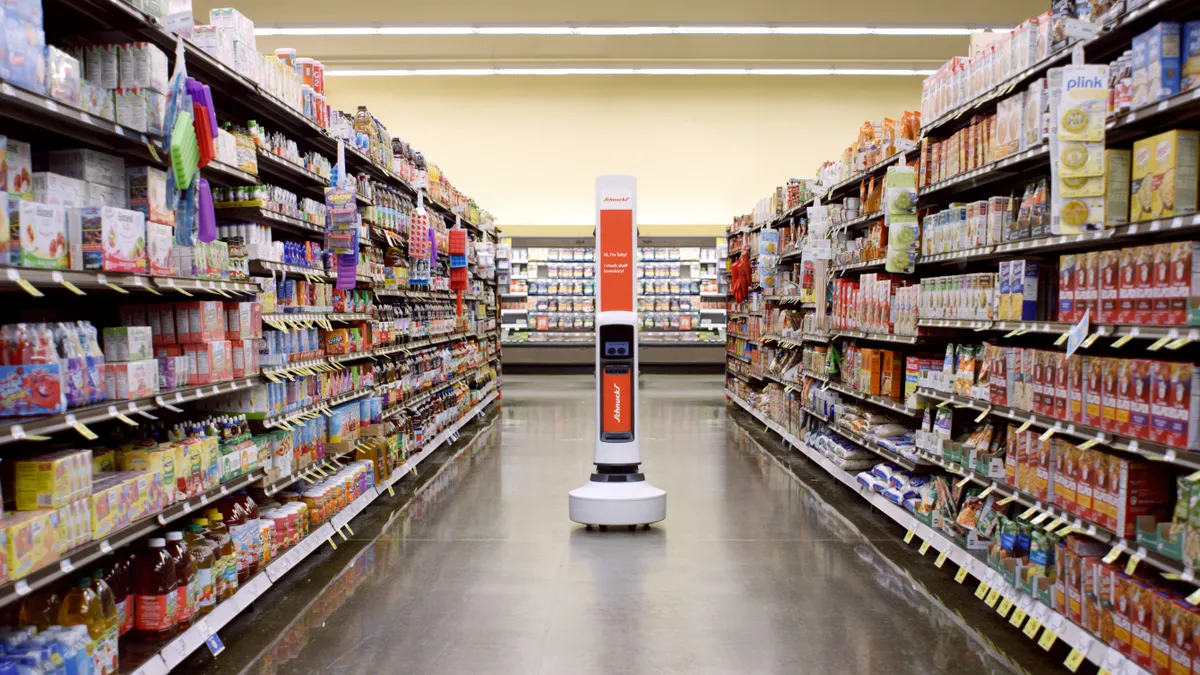Dive Brief:
- Schnuck Markets announced it will put Tally, the aisle-scanning robot developed by San Francisco-based tech firm Simbe Robotics, in 15 stores. The decision follows a successful six-week test of Tally in three St. Louis locations last summer.
- Tally is currently operating in four stores, where it scans all 35,000-plus products three times a day. Each scan conducts product and price tag audits, searches for out-of-stock items and recommends optimized locations for goods in the stores. Schnucks plans to put the robots in four more stores as soon as they become available.
- Dave Steck, vice president of IT and infrastructure with Schnucks, told Grocery Dive in an interview that Tally improves store efficiency as well as the customer experience by making sure the right products are always available on shelves. For its test last summer, the company selected some of its top-selling locations. "We figured if it can't run in our busiest stores then it isn't worth pursuing," Steck said.
Dive Insight:
In an interview at the Groceryshop conference in Las Vegas, Steck said last summer's six-week pilot with Tally was a way of testing the robot's data gathering ability. After the company liked what it saw, it decided to incorporate Tally's results in real-time store operations to improve shelf stocks and product accuracy.
Now, Steck said Schnucks is focusing its Tally rollout to locations that need its help the most. This includes stores that are experiencing a shortage of workers — a problem for retailers nationwide, he said — as well as stores that are starting to see more customers thanks to Shop n' Save store closures.
Last month, Schnucks acquired 19 Shop n' Save stores from Supervalu and has since rebranded them. However, 16 Shop n' Save stores went unclaimed, failed to attract a buyer and are slated to close in mid-November. Steck said those stores are drawing down their inventory, pushing customers to Schnucks stores.
"The crush of people that's anticipated is going to put a lot of pressure on our stock," Steck said.
Tally, he said, will help stores keep up with inventory. But he said the robots would be a good value even at normal volumes and staffing levels. Keeping shelves stocked and products matched with the right price tags, he noted, improves the shopping experience for customers. It also helps the retailer capture more dollars and saves workers valuable time that can be spent elsewhere in the store. Workers typically do one full inventory check each day, Steck said.
"If it takes four hours to do that scan, I'm going to miss a considerable part of the day," he said. "With Tally, I'm doing that three times a day and I'm doing the entire store."
With this, Schnucks joins numerous other retailers that have increased their reliance on automation to handle the basic blocking and tackling of retail labor while also gleaning valuable product insights. Walmart and Ahold Delhaize have also launched robots in their aisles. Walmart began piloting robots made by Bossa Nova Robotics in 50 locations last year and plans to put 360 autonomous floor-scrubbing bots in stores early next year, while Ahold Delhaize has piloted the googly-eyed Marty in a Giant store in Pennsylvania and a Food Lion location in Tennessee.
Retailers are also starting to incorporate automated solutions in online fulfillment. Kroger and Walmart are both piloting autonomous delivery vehicles, while startup grocer Farmstead just announced it has begun delivering via driverless vans in the Bay Area. Meanwhile, tech firms Takeoff Technologies and CommonSense Robotics are linking up with retailers to provide micro-fulfillment centers capable of filling online orders in cities and other population-dense areas.
The increasingly automated supermarket has drawn fire from consumers who claim retailers are replacing human workers with robots. Schnucks actually worked to get ahead of the issue last year by inviting media into its stores to discuss Tally and its role in stores, Steck said. Eventually, people came to realize it wasn't an issue.
"The equation for me has never been, what's the ROI based off of displacing people?" Steck said. "We have enough labor shortages in the stores that I can't possibly hire enough people that I would displace anybody with a robot."













